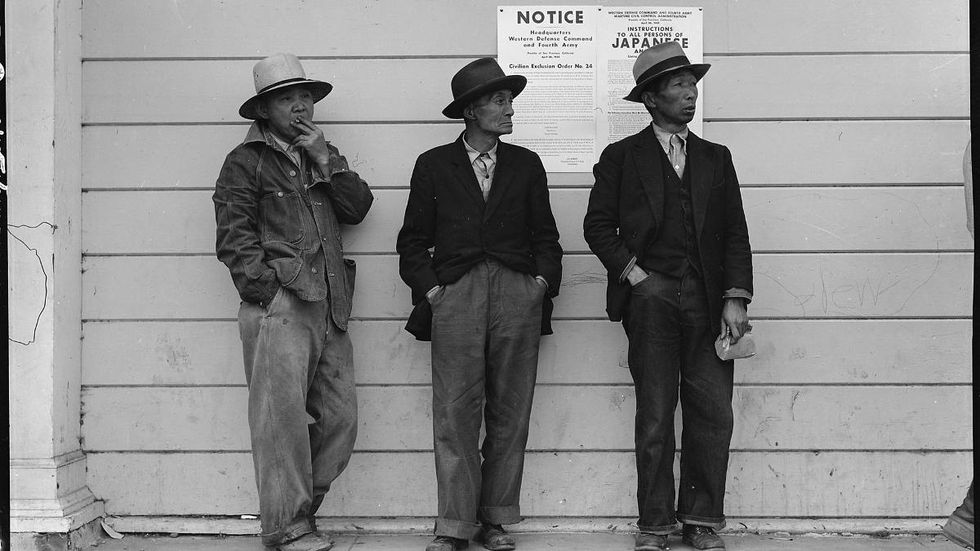
© 2024 Blaze Media LLC. All rights reserved.
On February 19, 1942, President Franklin Delano Roosevelt signed Executive Order 9066, authorizing the greatest act of despotism by the federal government in the 20th century. The order authorized the secretary of war to remove certain individuals, Japanese-Americans, from designated “military areas” along the West Coast.
After the bombing of Pearl Harbor, the United States government faced pressure from military officials who suspected a full-scale attack on the American homeland was imminent, politicians looking to curry favor as hawks during wartime, and a terrified American public. The racial prejudices of the time inflamed rumors of a vast espionage and sabotage campaign being waged against the country by Japanese immigrants and naturalized Japanese-American citizens.
Following Roosevelt’s direction, the military issued an order designating a coastal area from Washington State to Arizona banning “all persons of Japanese ancestry, both alien and non-alien” from residing in the area. FDR’s executive order forced approximately 120,000 Japanese-Americans to relocate to ten concentration camps. Congress passed legislation enabling the enforcement of Roosevelt’s order on March 21, 1942, after just one hour of debate in the Senate and thirty minutes of discussion in the House of Representatives.
What followed was the most egregious civil liberties violation in American history after slavery. FBI agents raided the homes of first-generation immigrants from Japan and arrested 1,212 innocent people. Personal property was confiscated, and the assets of any individual connected to Japan were frozen. Within the camps, people were forced to share living space with strangers and, outrageously, families were sometimes broken up and sent to different camps. The traditional structure of the family in Japanese culture was upended, as younger American-born children were the only ones allowed positions of authority in the camps. Relocation stripped Japanese-American citizens of the right to vote, as they were not permitted to leave the camps to vote where they lived. Their literal speech was restricted, as speaking the Japanese language was prohibited to prevent conspiracy.
The American government failed Japanese-Americans in totality. In three related Supreme Court cases, the court ruled that Roosevelt’s executive order as applied to U.S. citizens was constitutional. In Hirabayashi v. United States, Chief Justice Stone authored a unanimous opinion that rationalized racial discrimination against the Japanese as necessary during wartime. Stone wrote that “in time of war residents having ethnic affiliations with an invading enemy may be a greater source of danger than those of a different ancestry."
Fred Korematsu, an American-born citizen of Japanese descent, refused to relocate from his home in San Leandro, California. He was arrested and tried, his case eventually making its way to the Supreme Court. A 6-3 majority of the court upheld the government’s severe restrictions of civil rights and Korematsu’s conviction. "Pressing public necessity," Justice Black wrote in the majority opinion, "may sometimes justify the existence of such restrictions; racial antagonism never can."
There is no justification for Japanese internment. As a 1983 report by Congress concluded:
Executive Order 9066 was not justified by military necessity, and the decisions that followed from it—exclusion, detention, the ending of detention and the ending of exclusion—were not founded upon military considerations. The broad historical causes that shaped these decisions were race prejudice, war hysteria and a failure of political leadership.
It is the purpose of government to secure the unalienable, God-given rights of the people. By interning Japanese-Americans, President Roosevelt, the Congress, and the Supreme Court forsook their duty to protect the rights of American citizens and violated those rights instead.
Why revisit this shameful chapter of American history on Presidents Day? Because it is important that every American remember that we are governed by men, not angels. The institutions of American government are corruptible. They can be abused by men and women acting without virtue. Tyranny and despotism can happen here in America today, just as it has happened in the past.
Today, there are lingering questions about how the Obama administration may have politicized the government’s law enforcement and intelligence-gathering agencies during an election. In response to accusations of civil rights abuses, progressives in and out of the government are smearing those making allegations and demanding that our law enforcement agencies be shielded from presidential and congressional oversight. It is foolish to believe that any arm of the federal government is incorruptible, especially in light of the civil rights abuses generations of American citizens have suffered in the past.
It is the responsibility of every American to remember our history, to view our institutions with a critical eye, and to always remain vigilant in defense of liberty against encroaching tyranny.
#mc_embed_signup{background:#fff; clear:left; font:14px;}
/* Add your own MailChimp form style overrides in your site stylesheet or in this style block.
We recommend moving this block and the preceding CSS link to the HEAD of your HTML file. */
Want to leave a tip?
We answer to you. Help keep our content free of advertisers and big tech censorship by leaving a tip today.
Want to join the conversation?
Already a subscriber?
more stories
Sign up for the Blaze newsletter
By signing up, you agree to our Privacy Policy and Terms of Use, and agree to receive content that may sometimes include advertisements. You may opt out at any time.
© 2024 Blaze Media LLC. All rights reserved.
Get the stories that matter most delivered directly to your inbox.
By signing up, you agree to our Privacy Policy and Terms of Use, and agree to receive content that may sometimes include advertisements. You may opt out at any time.
